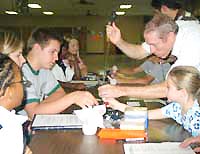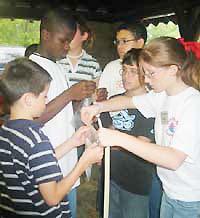Camp Gives Youth Look at Biotechnology
Camp Gives Youth Look at Biotechnology

 Youth attending camp in west Kentucky collected evidence then used biotechnology to solve a crime. The crime scene and follow-up investigation were a major part of the recent Biotechnology Camp held at the West Kentucky 4-H Camp.
Youth attending camp in west Kentucky collected evidence then used biotechnology to solve a crime. The crime scene and follow-up investigation were a major part of the recent Biotechnology Camp held at the West Kentucky 4-H Camp.
“The purpose of this camp and others like it is to help inspire and introduce young people to the field of biotechnology,” said David Hildebrand, a plant biochemist and geneticist with the University of Kentucky College of Agriculture.
Hildebrand said one of ideas behind camp and similar programs is that from a historical perspective better-paying jobs are the result of advances in science and technology.
Biotechnology is a rapidly developing field which has many applications including agriculture, medicine and law enforcement, but it also has applications in material science and engineering, Hildebrand said.
A task force in Kentucky has decided that there are certain areas where the state should be in the forefront. Five critical technologies have been identified in which the state can be competitive in the global marketplace, and one of those is biotechnology.
Campers are between 11 and 14 years old. That age range was selected because children at that age understand many of the principles if presented in the proper way and they are not so set on a particular career path.
“One of the reasons for choosing this group is to inspire future Einsteins to become the future leaders of biotechnology in Kentucky,” he said.
A crime scene was set up at the camp and detectives with the Hopkinsville Police Department outlined how evidence is collected. The students collected evidence and began analyzing it. Their analysis from the crime scene taught them to work with DNA, cut it and analyze it for differences among suspects.
Campers also extracted DNA from strawberries and cloned DNA into a lab bacterial host and analyzed the cloned DNA. Emerging careers in biotechnology were also discussed including renewable energy development and applications, cloning of animals, stem cell research and other applications in medicine.
Much of the preparation, organization, and science presentations for the camp were performed by Larry Clay Greunke, UK agricultural biotechnology undergraduate student, and UK technicians and research scientists Lauri Pulver and Scott Kinison.
“Like all new technologies there are ethical issues that need to be discussed and one has to appreciate regarding the applications of this technology,” Hildebrand said. “Do we apply it to everything we can do? Just because we can do it, should we do it? We want the kids to have an understanding that not only do the lab scientists need to be involved in the development of biotechnology but also social scientists and the rest of society.”
A 4-H Venture Grant was used to fund the camp along with another camp in north central Kentucky. A statewide camp is being planned that will have a competitive application process. Materials are being developed that 4-H agents across the state can use in what is called “biotechnology on a shoestring.” It uses items that can be bought at a local hardware store. Hildebrand said they also want them to work with science teachers in their counties to bring it into the classrooms.
“We hope that many of our young people in the future will have some understanding of biotechnology even if they don’t want to be scientists, including an understanding of its use in law enforcement or in medicine,” he said. “They will be a part of the populous that makes decisions on what we should do or what we shouldn’t, and we want people to make decisions with a good understanding of what they are deciding upon.”
Toni Riley, Christian County Extension agent for 4-H/Youth Development, helped organize the west Kentucky camp.
“I think it is always important for 4-H agents to be looking for new programs, new ideas that may not involve our traditional clientele,” she said. “The venture grant was specifically for farm families. This gives us opportunities to branch out and provide new programs that they probably don’t think of when they think of 4-H. Biotechnology is still very agriculturally based, but it gives us a broader spectrum to provide kids education in, a different venue, different setting and different people than they ordinarily would have been involved with.”
Campers came from across west Kentucky and were recruited by 4-H agents with recommendations from their teachers.
Jasmine Greinke of Ft. Campbell said she wasn’t looking forward to the educational aspects of camp but then found out crime scenes were involved.
“I’m really interested in things like that,” she said. “I thought it was very interesting. I didn’t know they had all the different color (fingerprint) powders. I just thought that they had one.”
Camper James Walther of Herndon came to camp because he is interested in majoring in animal sciences in college and thought it would be helpful to learn about biotechnology.
“I thought it was very neat getting to see a crime scene, and we’ve started looking at DNA and that’s been a lot of fun,” he said. “It’s been a really good thing, and I’m glad the people who have done this are willing to do it. It’s been very enjoyable.”